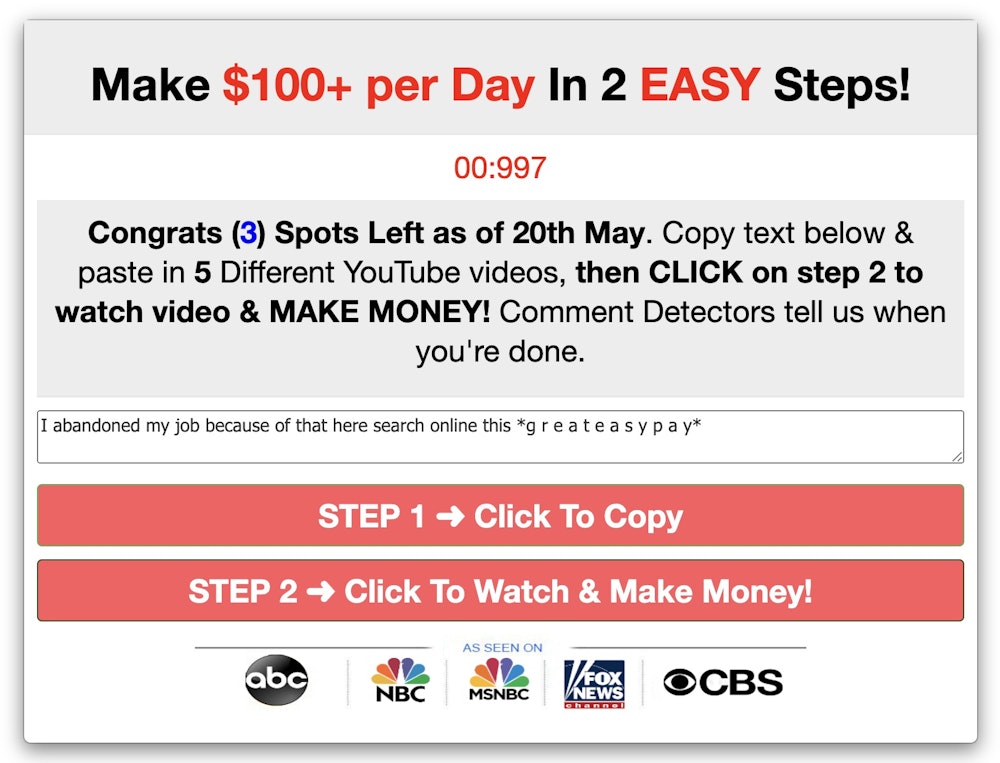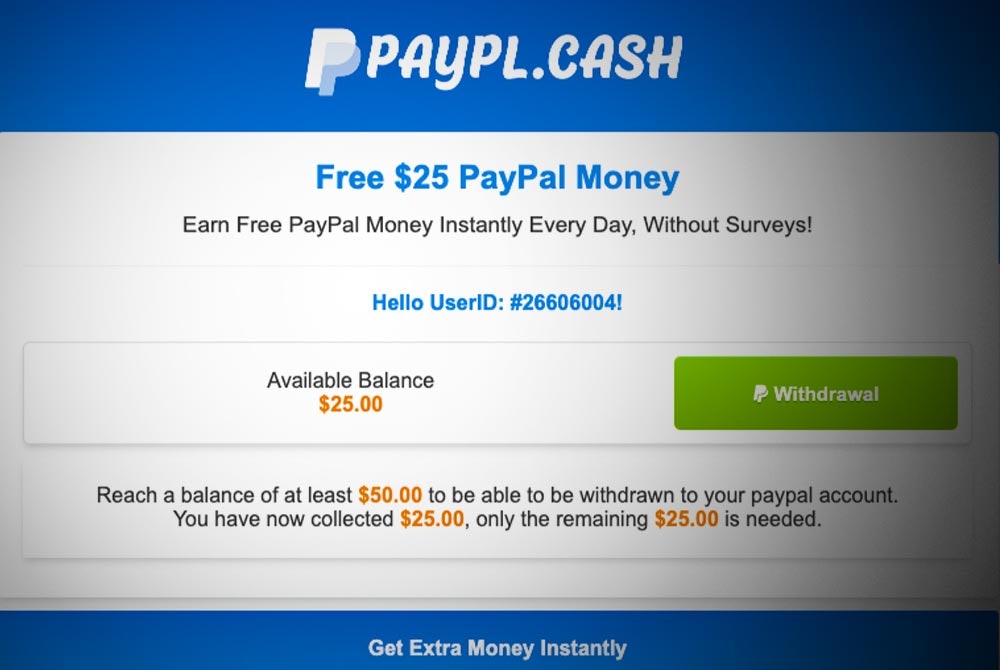- How the Free PayPal Money Scam Works
- How to Beat Free PayPal Money Scams
- Red Flags of Free PayPal Money Scams
- What to Do If You're Scammed Trying to Earn Free PayPal Money
- Frequently Asked Questions
For several years, PayPal’s users—and anyone on YouTube or with a smartphone—have become inundated with an array of scams that offer free PayPal money. One of the best things you can learn is how little any of it has to do with PayPal, specifically, despite the use of the brand name and the trust the online money transfer system has built over the years, which is precisely why scammers use it to try to fool people.
How the Free PayPal Money Scam Works
The PayPal free money scam starts with an ad or message that says you can earn free PayPal money quickly and easily. As with most scams, an offer too good to be true usually is. Here's how this scam works.
You Receive an Offer to Earn Free PayPal Money
You receive a text, email, or see an ad or link for free PayPal cash. This message may look like it's from PayPal, but it's not. Scammers use the PayPal logo and branding to make you think it's a legitimate offer.
It will promise free PayPal money instantly and tell you it's a fast and easy way to get PayPal cash.
After clicking the link or ad, you'll be sent to a site that will feature some message telling you to click a button to start earning your free PayPal money instantly.
Example YouTube Comments"I got $2642 after searching a lot of sites I found this system freepypmoney.win/?Fa3eD7"
"I left my 9-5 because of that seek out on-line for o n e p p c a s h"
" Iam really happy to announce to you that the very best team I never regret working with they are very great p y p t o l m o n . x y z"
YouTube is a common platform to find links to free money sites since these scam sites require you to repost links as comments.


You Enter Your Information
The site will tell you to enter your email address so they can give you instructions on what to do to claim your free PayPal money. For example, you may be told to copy and paste some text and a link to five YouTube videos—this is so more people will see the link and click through, just as you did.
You Complete the Task
You confirm you completed the task and are directed to a page where you can choose your earnings, such as free PayPal money, and may even include things like Walmart gift cards.
These free PayPal money sites are usually minimal and start with asking you to complete a survey or share a link on social media. Once you click that you've done the task, you'll be sent to a different website altogether, and that's where more tasks and questions start coming in.

More Questions Come Your Way
Now the scammer has you roped in. First, they will ask you some questions before you can start earning your free PayPal cash. Then, they will continue to send you surveys or questions to answer, promising free PayPal money fast once you answer. However, there is no prize. Instead, it's all part of an affiliate scheme designed to steal your money.
The scammer might even tie their marketing scam to a legitimate and well-known brand or product, such as Walmart, asking your opinion on that brand or product. But you'll encounter more questions that might seem legitimate for a marketing company to ask to understand their customers' demographics, geographic location, income bracket, and more. Then comes the final straw—one that should cause you to hit the brakes—when they ask for your credit card number or banking information.
You Enter Your Credit Card Information, and Your Money is Stolen
You might ask yourself, "Wait, what does this have to do with PayPal anyway?" But you've gone so far down the rabbit hole and are determined to claim your free PayPal money, so you enter your credit card information.
None of it has anything to do with PayPal. It's an affiliate scheme to get to your money, using the PayPal brand and often a secondary product to gain your trust. After entering your credit card information, it will be charged, and you never get your free PayPal money.
While there are good and well-meaning affiliate marketing programs out there, those promising free PayPal money are not. Good affiliate marketers would steer clear of anything like this and offer meaningful content and uses for products in hopes you would buy them in good faith. Instead, these PayPal cash scams trick you out of your money using the affiliate template.
How to Beat Free PayPal Money Scams
The first and best maxim to live by while doing anything online is "if it seems too good to be true, it probably is." However, it's tempting for everyone to try to find and land a great deal. What's a better deal than free money from anyone? But it's important to remember that scammers are counting on that line of thinking. These days, we all have to do our best to outsmart the scammers.
Don't Believe the Hype
The best way to beat free PayPal money scams is not to believe the hype where free money is concerned. Get rich quick schemes are never good news.
To beat scams offering free PayPal cash, you should never:
- Enter or give out your credit card or other personal information on a site that isn't part of the official https://paypal.com site.
- Click on links that steer you away from your text message, email platform, or website. If you are interested in the offer, jot down the details, then do an online search to determine if the offer is legitimate.
- Call any telephone numbers listed on the offer. Again, conduct due diligence with a web search, or call a reliable and secure number to talk to an authorized PayPal customer service representative to ask about the offer.
It's important to verify links and contact details to beat imposters.
Red Flags of Free PayPal Money Scams
- It's not a legitimate PayPal website: "PayPal" doesn't appear anywhere in the website URL, as it does here: https://www.paypal.com/us/home.
- The site is not secure: There is no padlock in the address bar on your browser, and there is only an HTTP prefix instead of the secure HTTPS prefix to the web address. These indicate that the website has SSL certification to ensure encrypted communications, which you would have when dealing with PayPal directly.
- You're asked for a lot of information: The request for more information, such as your email address, even if that is how the scammer contacted you. Anything that draws you further into the scheme, scammers will use. So, if they ask for your full name, address, telephone number, or banking information, you should see nothing but red flags.
- Typos and bad grammar and spelling: The official PayPal site and any legitimate communications from PayPal won't have any typos or grammatical/spelling errors. Scam websites also tend to look a bit sketchy, with poor design, and look very low budget.
To avoid future PayPal scams and any online scams, you can take several precautions to keep your money and information safe.
What to Do If You're Scammed Trying to Earn Free PayPal Money
If you have fallen for this scam, you must act quickly to recover some of your losses. Unfortunately, there may not be much you can do to get your money back, but it's certainly worth a try.
Contact Your Bank/Financial Institution
If your credit or debit card has been charged fraudulently, immediately flag this with your bank. They will cancel your cards so the scammer won't be able to charge any more money to them, and in some cases, your bank may refund you the money that was taken.
Monitor your accounts regularly and dispute any fraudulent transactions.
Change Your Passwords
Change your PayPal password and update your security questions right away. This is especially important if you entered your personal information and even your login information while completing survey questions.
Report the Scam to PayPal
Visit the PayPal Resolution Center (you'll need to sign in to your account), then click "Report a problem" to report the PayPal free money scam. Once there, select the appropriate prompt that allows you to elaborate on the details of the incident.
You can also forward a suspicious email or website to [email protected], which alerts the PayPal fraud investigative team who works to stop scammers.
Report the Free PayPal Money Scams to the Authorities
You can report scams and online fraud to the Federal Trade Commission (FTC) and the FBI's Internet Crime Complaint Center (IC3). This won't help you get your money back, but it will help the authorities stop scammers in their tracks.


Comments